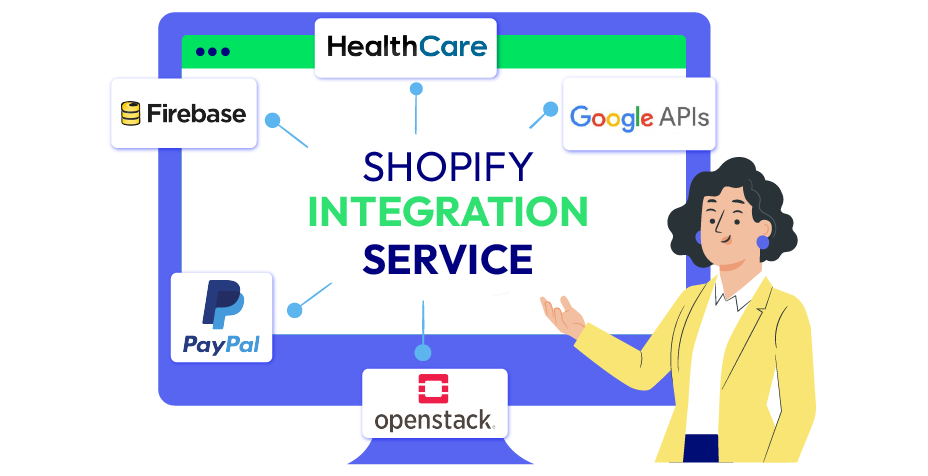Best 10 Shopify PIM Systems in 2025

Managing product information efficiently is essential for staying competitive in today’s e-commerce landscape, especially when running a Shopify store with a growing product catalog. To ensure your product data remains accurate and consistent across all sales channels, selecting the right PIM (Product Information Management) system is crucial.
In this article, we’ve put together a list of the top 10 Shopify PIM systems in 2025. These systems have been carefully chosen for their seamless integration with Shopify, their ability to streamline product data management, and their potential to drive your business growth.
Check out our carefully selected list below to discover the perfect PIM solution that can enhance your Shopify store’s performance and simplify your product management process!
What is PIM?
PIM (Product Information Management) is a system or platform used to collect, organize, and manage detailed product information for a business. Product information, from descriptions and images to pricing and customer feedback, is managed in a PIM system.
PIM systems can connect to other business software like accounting, customer management, and sales systems to access and manage product information from one central place. Once processed, PIM administrators can organize product information into categories and connect these categories to various sales channels.
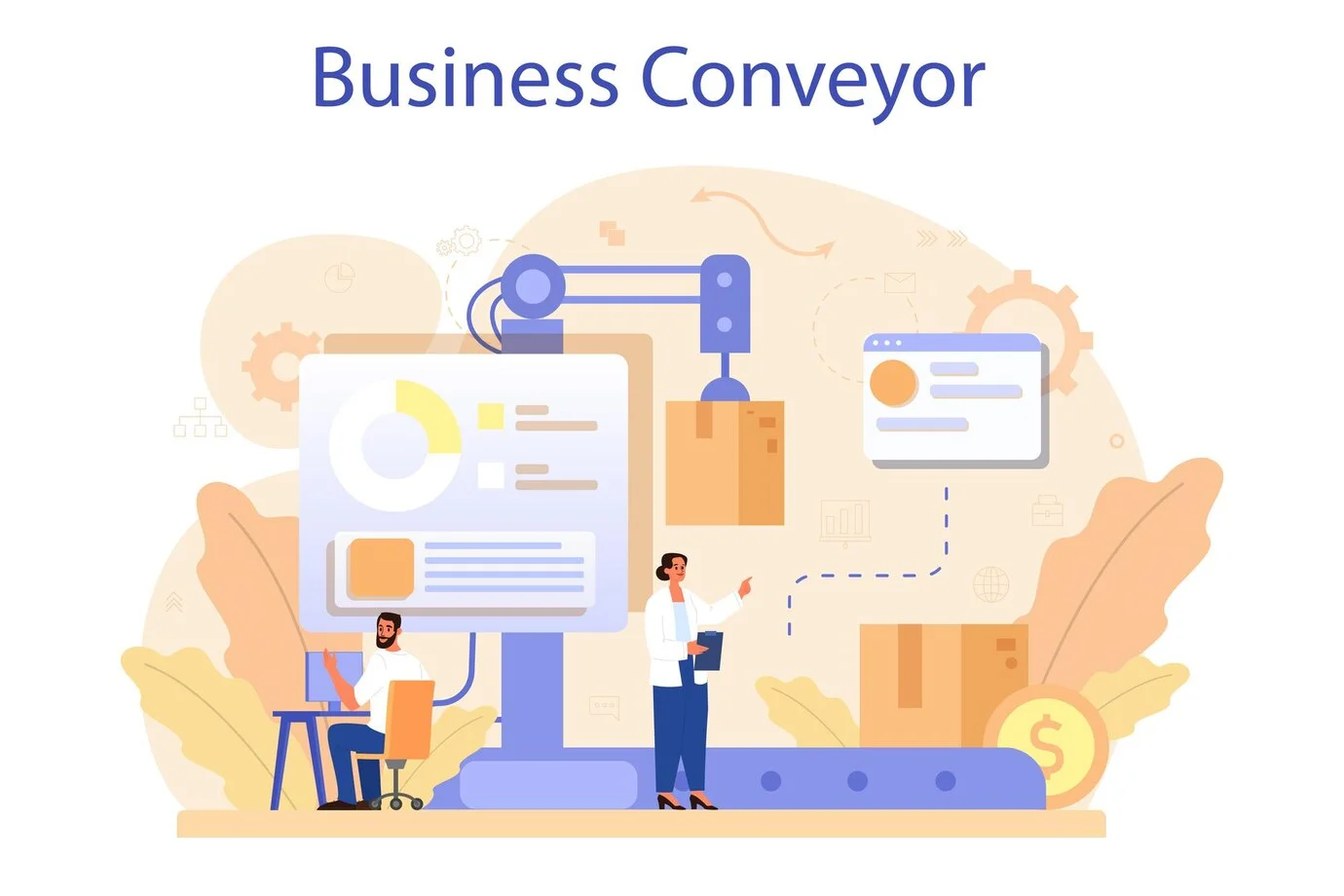
New trends in PIM are changing how businesses handle e-commerce. A study by Fortune Business Insights projects that the product information management market will expand from $4.47 billion in 2024 to $20.66 billion by 2032, with a compound annual growth rate of 21.1%.
Advantages of integrating PIM into Shopify
When it comes to maximizing the efficiency and impact of your e-commerce operations, leveraging a powerful PIM system offers numerous benefits. Here are some key advantages that a well-integrated PIM system can bring to your business:
- Centralized product database: Combine all product information into a single, easily accessible location for better management and organization.
- Improved Data Quality: Enhance the accuracy, consistency, and completeness of product data, ensuring reliable and up-to-date information.
- Faster Product Launches: Speed up the process of bringing products to market by simplifying creation and setup
- Consistent Product Information: Maintain uniform and accurate product details across all sales channels to keep your brand consistent.
- Smooth Multi-Channel Sales: Easily update and manage product info across different platforms to reach more customers and keep track of inventory.
In general, powerful PIM tools in market can greatly enhance your e-commerce operations by centralizing product information, improving data accuracy, and simplifying management. This integration leads to more efficient processes and a consistent customer experience, ultimately supporting your business’s growth and success.
10 Best PIM for Shopify
1. Salsify
Salsify is an effective PIM tool that centralizes and simplifies the collection, enhancement, and sharing of product information. With features for managing digital assets and improving content, Salsify is a great option for businesses aiming to enhance Shopify PIM strategies and provide a consistent shopping experience.
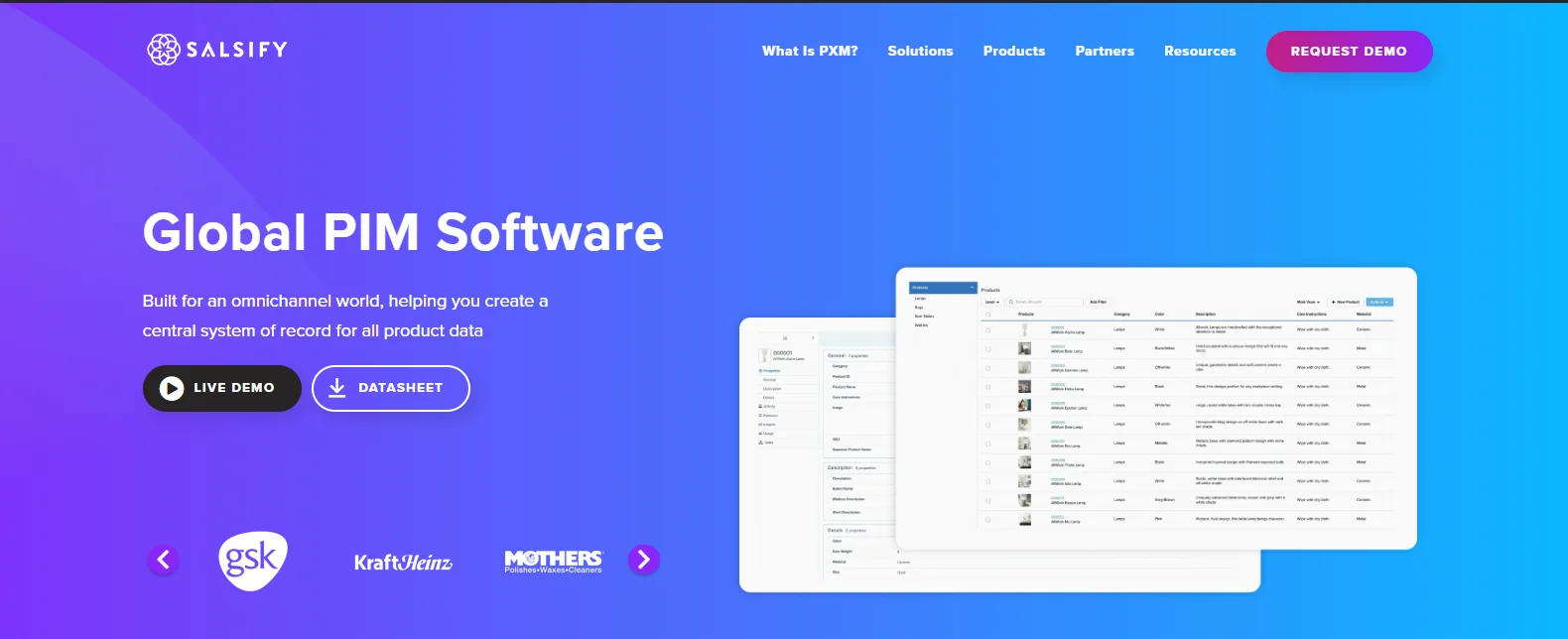
Pros:
- Organize all your digital assets, including photos and videos, in a single location to make content management easier.
- Seamlessly send customized content to different sales channels in the right formats, making sure your product information stays consistent everywhere.
- Move around the platform smoothly, thanks to its intuitive and user-friendly design.
- Make sure your product data is precise and thorough with strong validation and enrichment tools.
- Monitor product performance, observe customer behavior, and gather valuable insights.
Cons:
- Salsify’s extensive features can be overwhelming for beginners, and the high costs make it less suitable for small-to-medium-sized businesses.
- Bulk editing and deletion of products can be difficult and cumbersome, requiring more time and effort.
- Users often experience slow response times from the support team, delaying issue resolution.
Pricing: Negotiating
Best for: Large Enterprises
2. Acquia DAM (Widen)
Acquia DAM (formerly Widen) is a powerful tool for managing digital files and content. It helps organizations keep all their digital assets in one place, making it easier to access, organize, and share them across different teams and platforms.
This system offers both cloud-based and on-premise solutions, so it can work for businesses of any size and adapt to their specific needs. It ensures that all digital content is well-organized and maintains a consistent brand image.
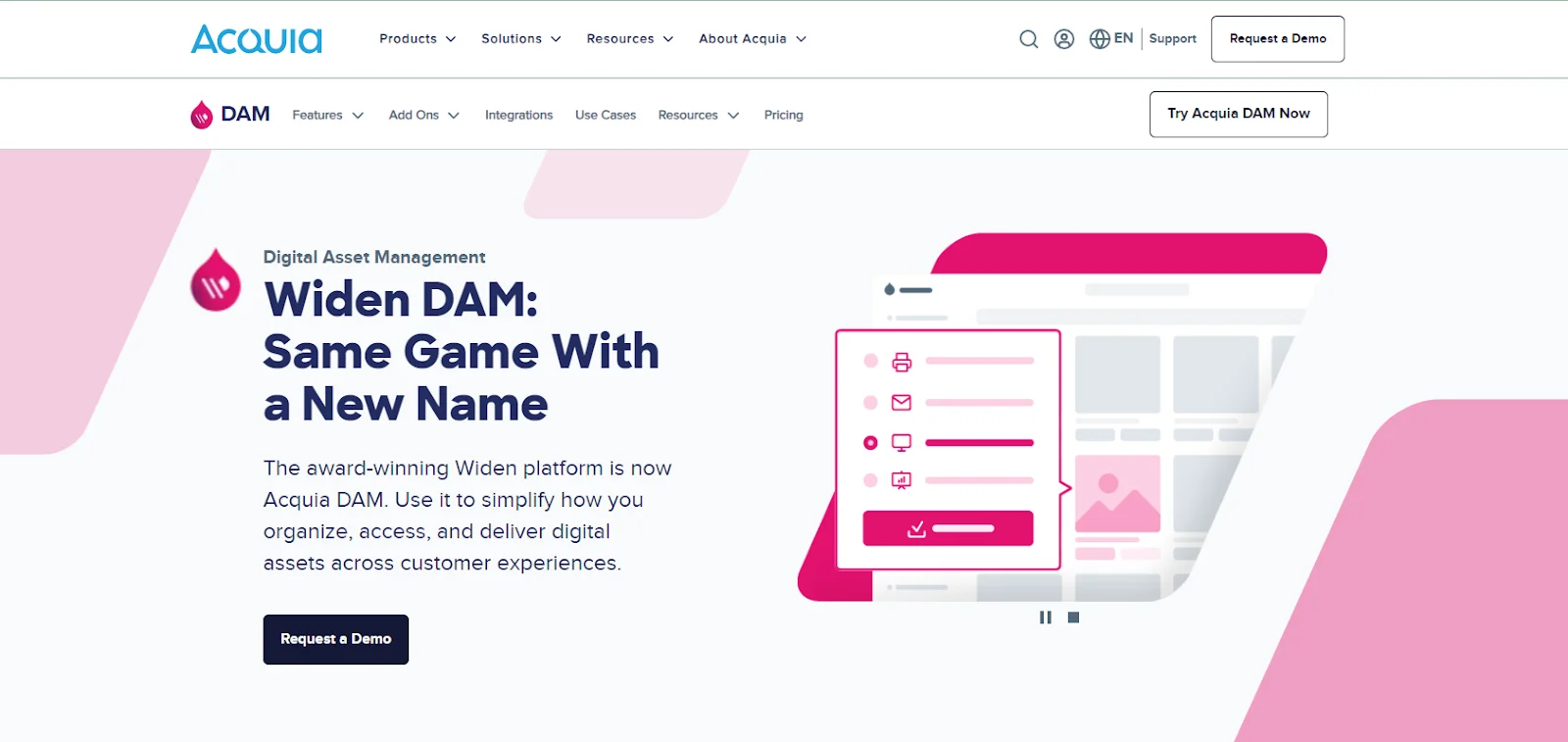
Pros:
- Simplify sharing and organizing files across the company with intuitive categorization and quick search capabilities.
- Features clean, accessible portals that enhance user experience and effectiveness.
- Deliver assets quickly worldwide and maintain a stable platform with effective communication when technical issues occur.
- Provide great support and services, including website and content management, as well as color correction.
Cons:
- Finding detailed documentation can be challenging, which may be due to either the software itself or how it was set up.
- Lacks the option to filter files by GIF format, which can be inconvenient.
- Users no longer need to sort through disorganized drives but may face confusion with certain features like the shopping cart model.
Pricing: Negotiating
Best for: Medium to Large Enterprises
3. SPS Commerce
SPS Commerce is a leading cloud-based solution for supply chain and retail management designed to streamline and optimize the flow of information between retailers, suppliers, and logistics providers.
It focuses on enhancing supply chain efficiency through a comprehensive suite of tools that facilitate communication, data integration, and process automation.
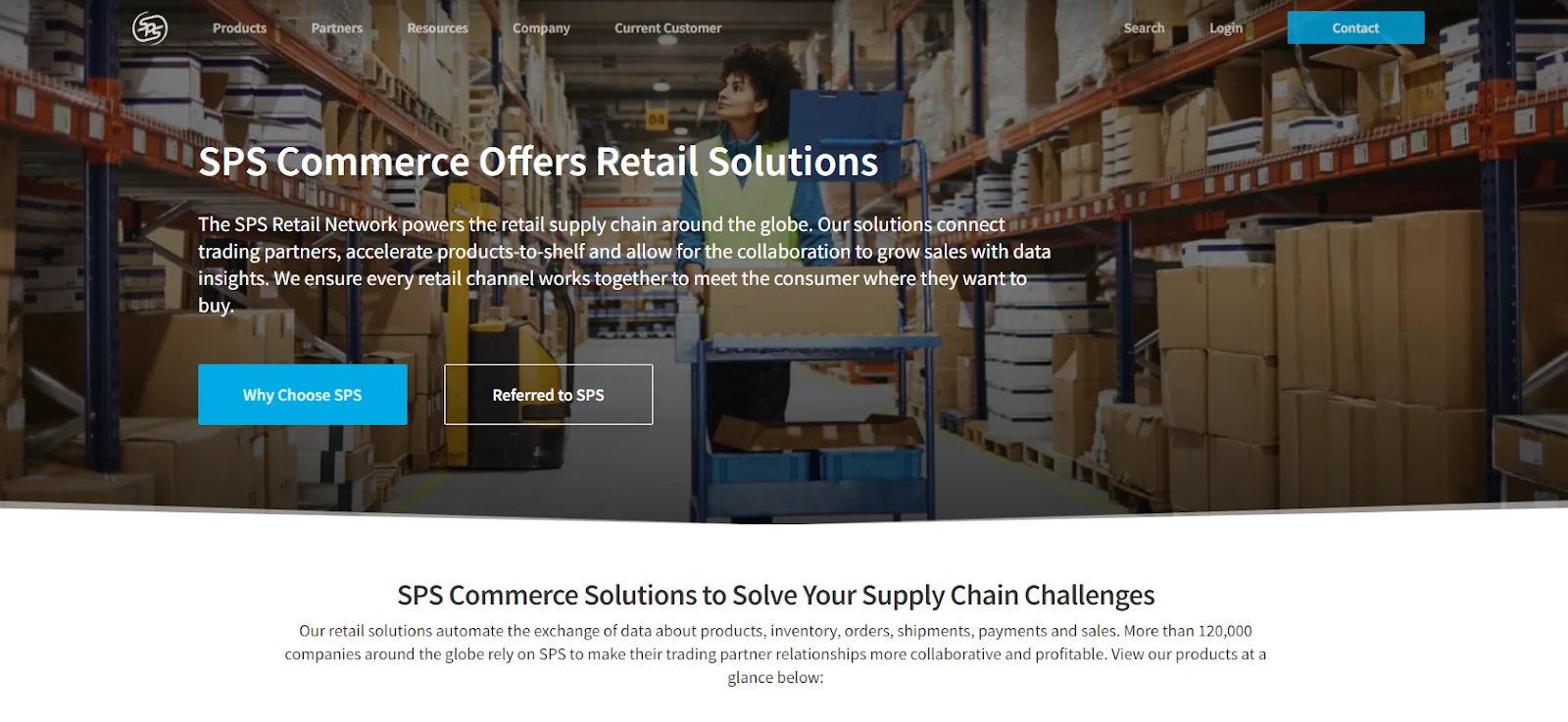
Pros:
- Connect easily with a wide range of retailers and trading partners, making EDI transactions simpler.
- Leverage strong expertise in EDI standards to ensure smooth communication between businesses.
- Support businesses of all sizes, from small suppliers to large enterprises.
- Integrate seamlessly with various ERP systems and other business applications.
- Receive dedicated customer support to help with setup, troubleshooting, and ongoing maintenance.
Cons:
- SPS Commerce can be quite expensive, which might be a concern for smaller businesses.
- Setting up and using the platform can be complex and may require technical skills or professional help.
- Relying heavily on SPS Commerce might make it difficult to switch to other providers later.
- Customization options are available but may not be as extensive as those offered by other platforms.
Pricing: Negotiating
Best for: Retailers and Suppliers of All Sizes
4. Bynder
Bynder is a cloud-based product information management (PIM) platform designed to centralize and streamline the handling of product data. It helps organizations efficiently store, organize, and distribute their product information while ensuring brand consistency and supporting collaboration across different teams.
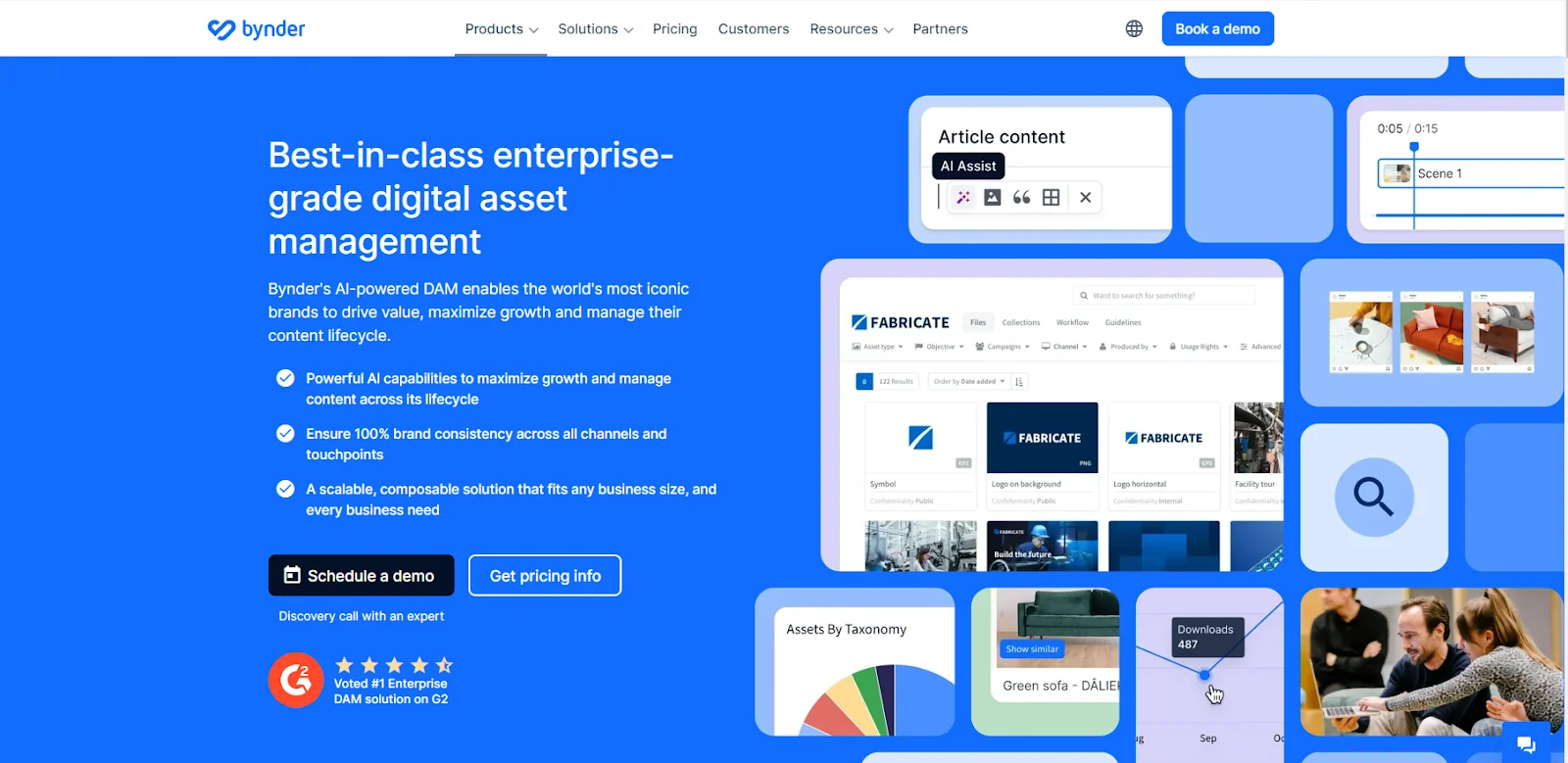
Pros:
- Centralize all digital assets in one easy-to-access location for improved organization and management.
- Enhance brand consistency by providing tools for managing and distributing assets with uniform branding.
- Make teamwork easier collaboration among teams with features like shared workspaces, asset review, and approval processes.
- Seamlessly integrate with many third-party applications, such as CRM, CMS, and marketing tools.
- Provide advanced search capabilities and metadata management to quickly locate and use assets.
Cons:
- Require significant setup time and effort, which may need technical expertise or professional assistance.
- Incur potentially high costs, which could be a challenge for smaller businesses with tight budgets.
- Pose a learning curve for new users, making it necessary to invest time in understanding and utilizing the platform’s features.
- Offer limited customization compared to some other DAM platforms, which might not meet all specific needs.
Pricing: Negotiating
Best for: Medium to Large Enterprises
5. Pattern PXM
Pattern PXM is a modern approach designed to optimize and enhance the presentation of product information across multiple channels, including Shopify. It focuses on delivering a swift and engaging product experience by integrating comprehensive product data management with a strong emphasis on improving the user experience.
This approach is particularly effective for Shopify PIM, helping businesses present consistent and high-quality product data throughout their e-commerce platforms.
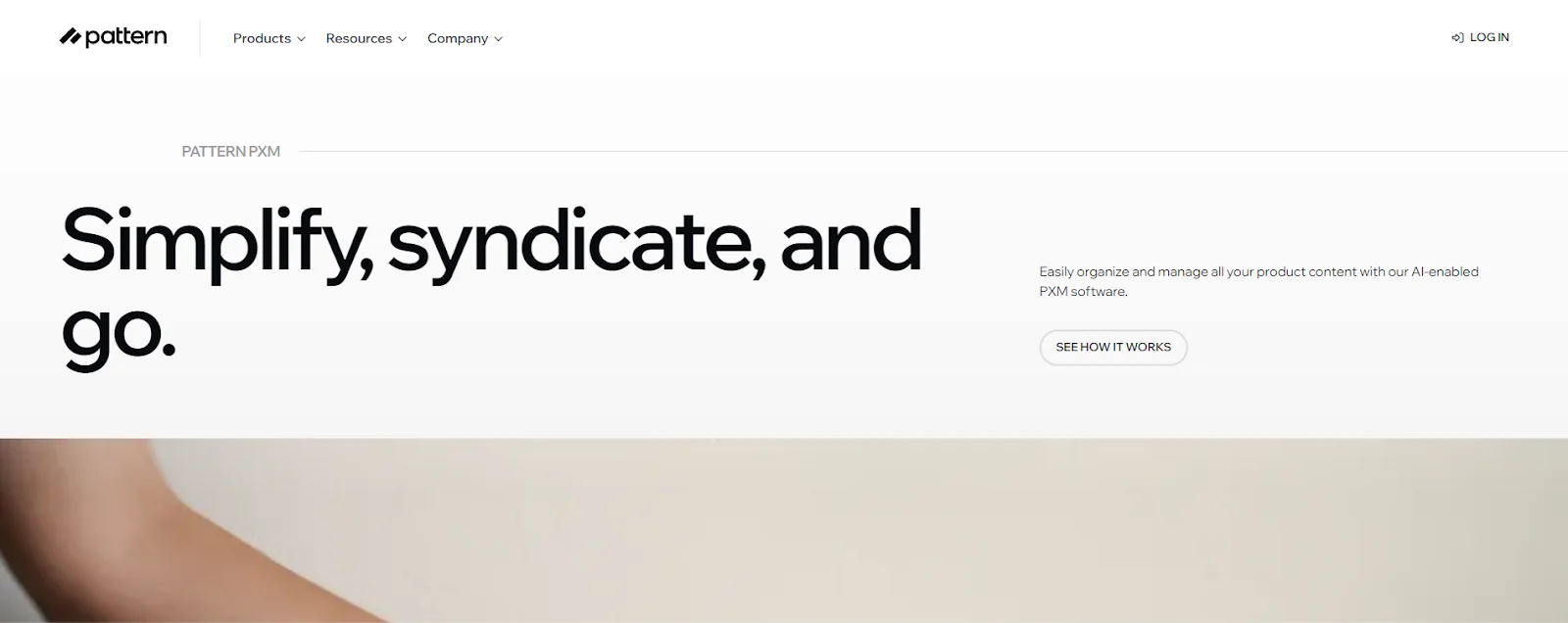
Pros:
- Enhance the client experience by delivering consistent and high-quality product information across all touchpoints.
- Centralize product data to ensure accuracy and reduce inconsistencies, which is vital for platforms like Shopify.
- Optimize product content presentation with tools that allow for customization and personalization based on customer preferences.
- Streamline workflows with features that support easy management and updating of product information across different platforms.
Cons:
- Require a significant initial setup and configuration, which may need technical expertise or professional assistance.
- Have a learning curve that requires time and effort to fully understand and use the platform’s features effectively.
- Offer limited customization in some areas compared to other PXM solutions, which might not meet all specific business needs.
Pricing: Negotiating
Best for: Retailers and E-Commerce Businesses
6. Kontainer
Kontainer is a comprehensive PIM platform designed to help businesses centralize, organize, and distribute their product data efficiently. It focuses on providing a streamlined solution for managing product information across various sales channels and systems.
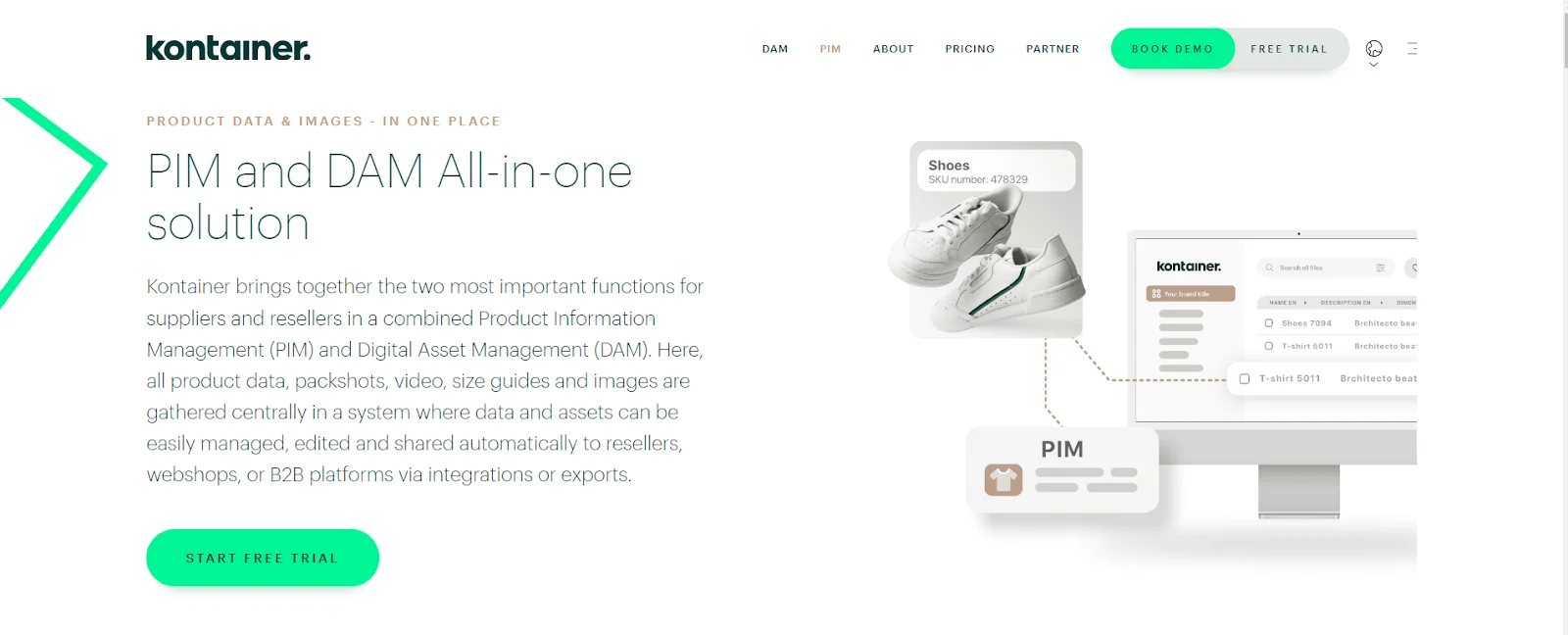
Pros:
- Package apps and their dependencies into containers so that it’s easier to deploy them across different environments.
- Improve efficiency with lightweight containers that use the host operating system’s kernel, which enhances resource use and performance.
- Scale applications easily by adding or removing containers as needed.
- Isolate applications from each other, which reduces conflicts and increases security.
- Access support from a large, active community of developers who help improve and troubleshoot the platform.
Cons:
- Add complexity in setting up and managing the platform, especially for those new to container technology.
- Require time to learn how to use effectively.
- Expose security risks due to potential vulnerabilities in the operating system or container runtime.
Pricing:
- Business Plan: $640 per month
- Professional Plan: $1285 per month
- Premium Plan: $1875 per month
- Enterprise Plan: Custom pricing
Best for: Small to Medium-sized Enterprises
7. Onpage
OnPage is a product information management (PIM) platform that helps businesses efficiently manage and centralize their product data, particularly for online stores and retail operations. It focuses on making product data management simpler and more accurate to boost online sales and improve the customer experience.
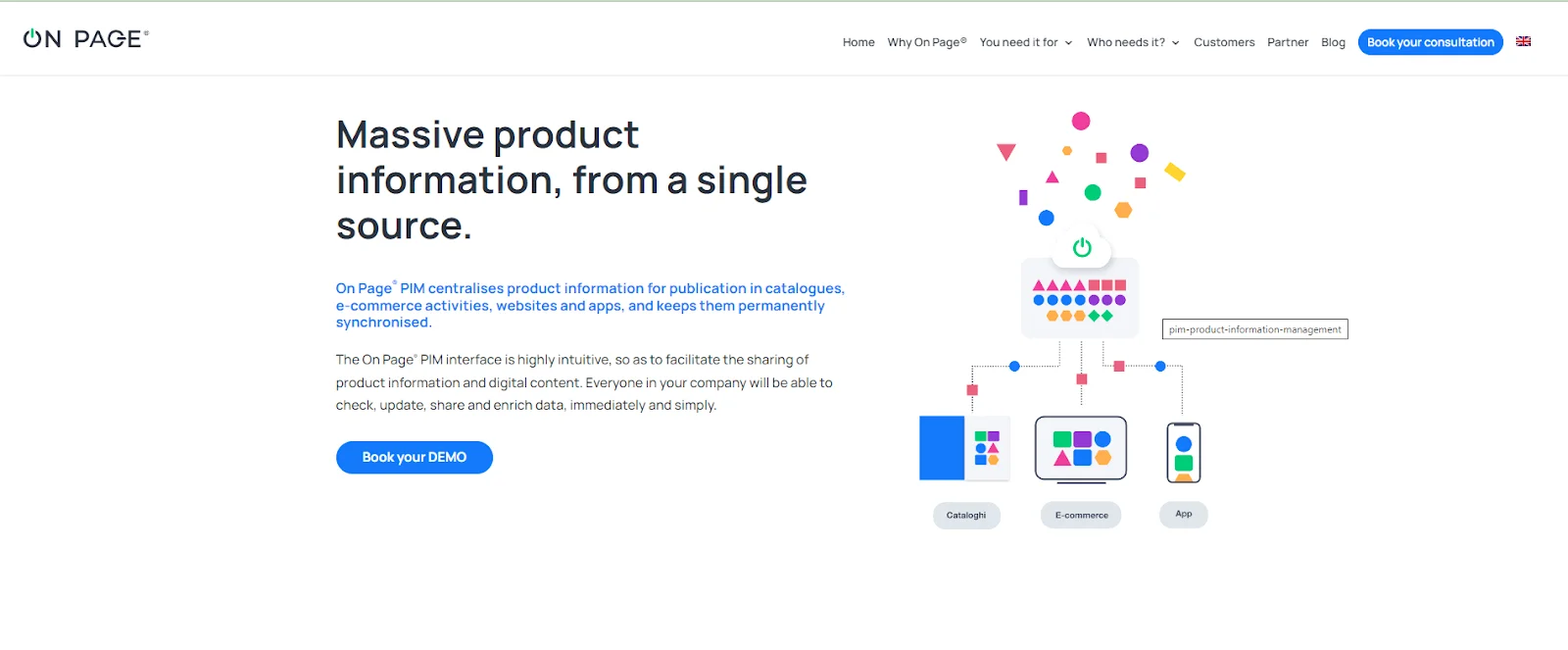
Pros:
- Centralize all product information in one place, making it easier to update and manage data across different channels.
- Ensure product data accuracy by offering tools for checking and improving data, so all product details are consistent and current.
- Boost online sales performance with seamless integration with e-commerce platforms, ensuring product details are synced smoothly.
- Improve team collaboration with features that allow for easy review and approval of product information.
- Scale easily with growing product catalogs and expanding business needs without losing performance.
Cons:
- Require some setup and configuration that might need technical help or professional services.
- Involve costs that might be high for smaller businesses, depending on how much of the platform you use.
- Have a learning curve, so it might take time to understand and use all the features effectively.
- Limit customization options compared to other PIM systems, which may not fit every specific business need.
Pricing: Negotiating
Best for: Retailers and E-Commerce Businesses
8. Sales Layer
Sales Layer is a PIM solution designed for product marketers, emphasizing robust analytics features. It helps you evaluate the quality of your product information to ensure your catalog remains accurate and complete. This is especially beneficial for managing complex product ranges.
With seamless Shopify PIM integration, Sales Layer enhances your ability to keep product data precise and up-to-date across your online store and other sales channels.
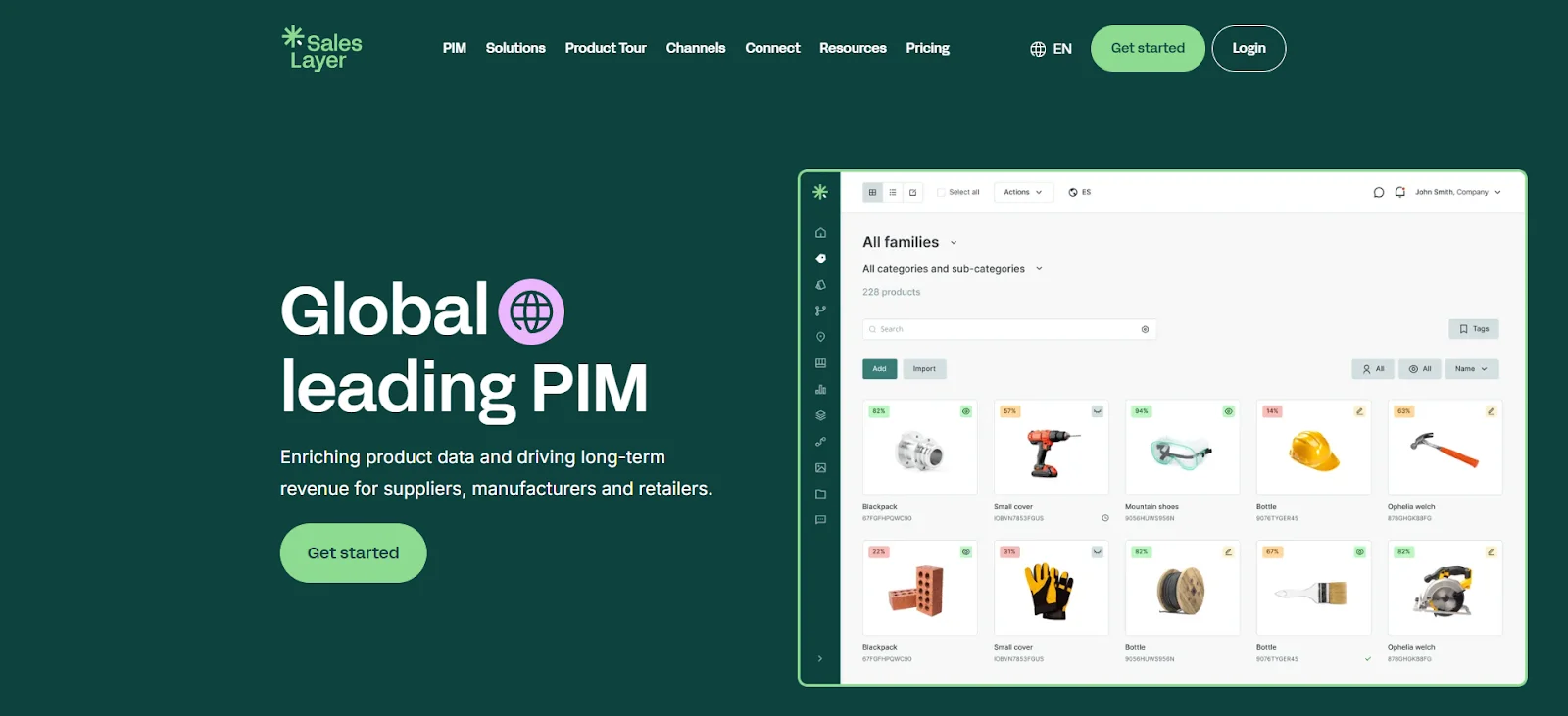
Pros:
- Use cloud-based access to view and manage your product data from any location, ensuring flexibility and convenience for your team.
- Keep your product information current across all channels with immediate updates.
- View detailed reports to track and fix issues in your product catalog.
- Easily manage and store your images, videos, and other media in one place.
- Create and automate processes to make managing data faster and more efficient.
Cons:
- Sometimes, transferring information takes longer, which might affect how efficiently things run.
- Getting started with the system can be challenging, especially for businesses with large or existing systems.
Pricing: Negotiating
Best for: Medium Enterprises
Shopify Integration Service
Let's seamlessly connect your store to powerful tools and platforms and accelerate sales like never before!
Learn more9. Plytix
Plytix is an PIM tool that helps teams work together to manage product information and sell products across different channels. It features a user-friendly interface and integrates both product information and digital asset management. Ideal for small-to-medium-sized businesses but scalable for larger enterprises, Plytix simplifies managing and distributing product data, media, and pricing across various channels.
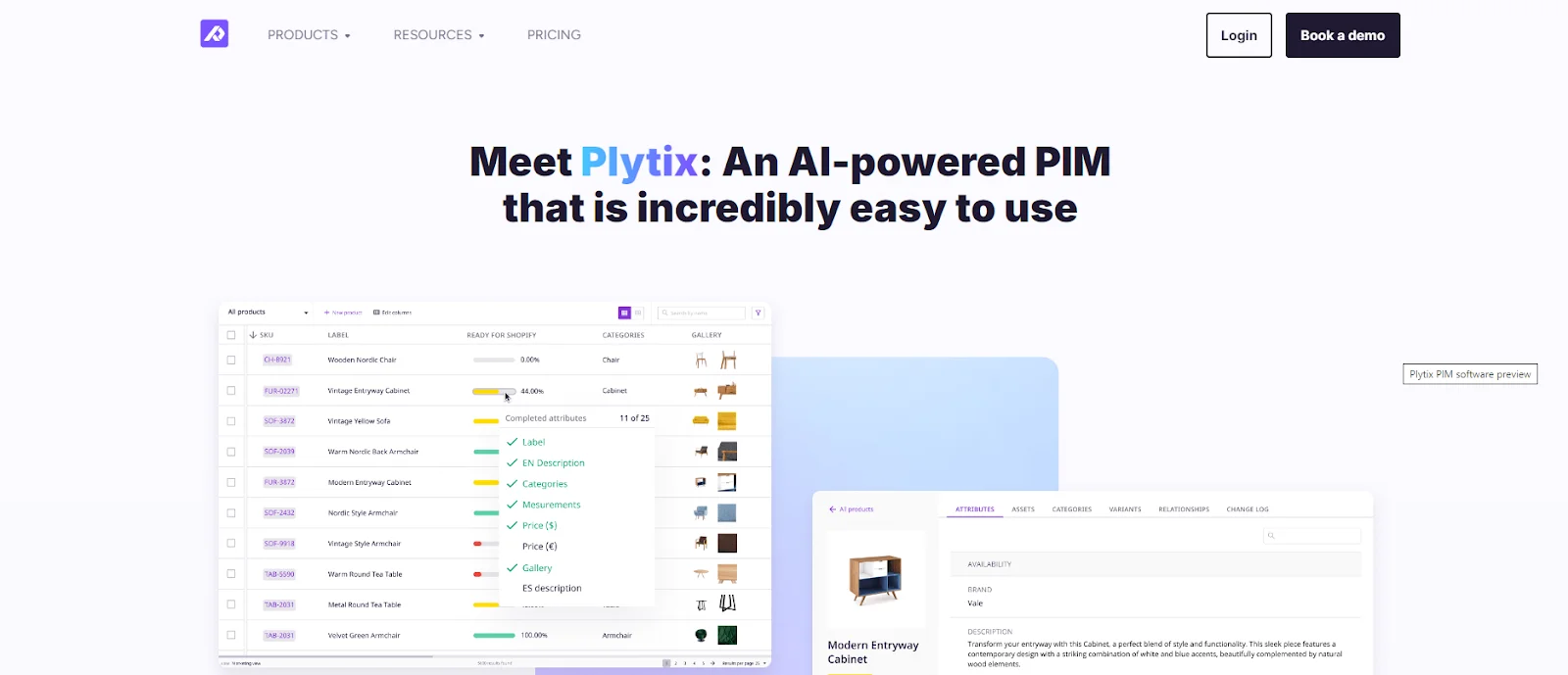
Pros:
- Centralize all your product data in one location, accessible to an unlimited number of users.
- Simplify bulk editing and automate updates for large datasets efficiently.
- Distribute precise product information across multiple channels.
- Recommend related products to boost average order value.
- Easily define product relationships such as cross-sell, upsell, and accessories with just a few clicks.
Cons:
- Performance problems have been reported with extensive product catalogs or complex data structures.
- Some users have indicated that certain features of the software are not fully developed and that the platform may be slow to introduce new capabilities.
Pricing:
- Basic: $450/month
- Custom: $750/month
- Unlimited: $1,650/month
Best for: Small to Medium-sized Enterprises
10. Catsy
Catsy is a PIM solution crafted to streamline the management of all your product information in a single location. With its highly customizable database, Catsy allows you to create various materials such as flyers, pricebooks, spec sheets, and catalogs.
Equipped with automation, content enrichment, and analytics features, Catsy efficiently manages and distributes product data, including meeting your Shopify PIM requirements.
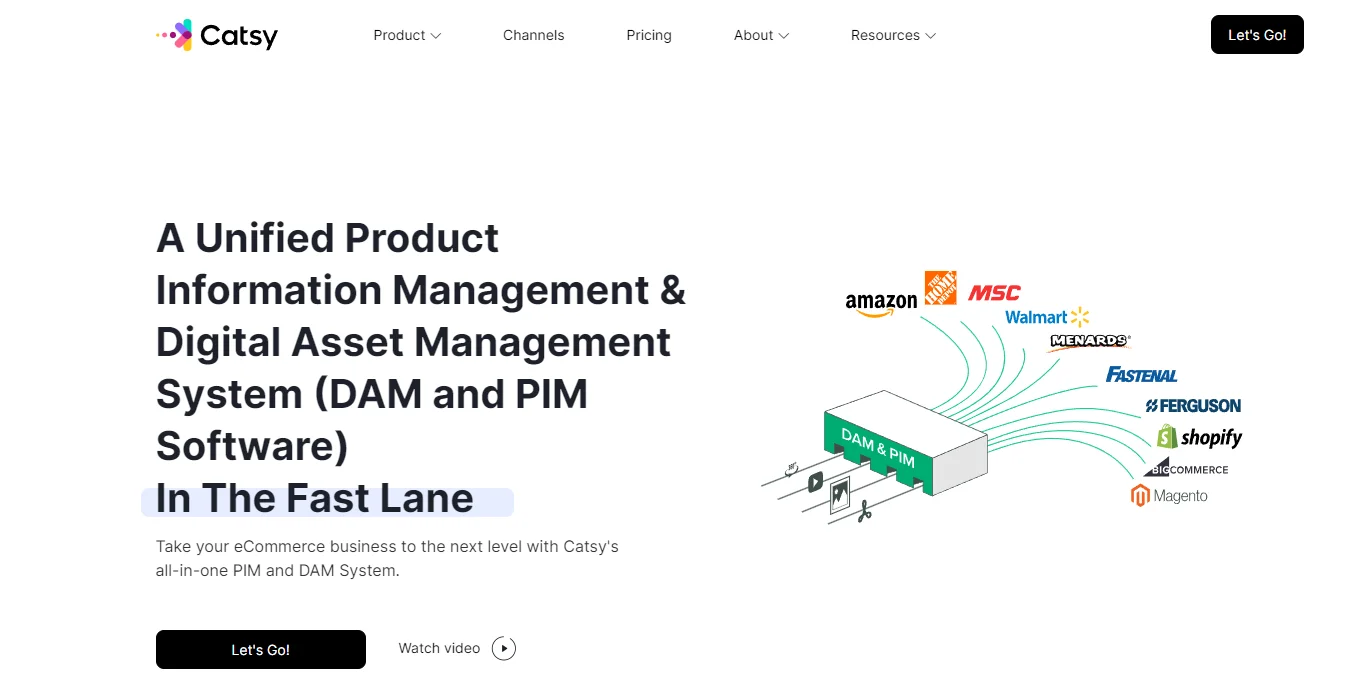
Pros:
- Enjoy smooth navigation of the platform thanks to its simple and clear design.
- Quickly add product data to various marketing materials, keeping everything consistent.
- Adjust the platform to fit your business’s specific requirements.
- Manage different types of data and file formats, making the platform adaptable to various needs.
- Get prompt help from a support team that effectively addresses your issues.
Cons:
- Search functionality can be slow, which may reduce overall efficiency.
- New users may experience a steep learning curve when getting started.
- Handling large volumes of data can lead to slower processing speeds and workflow delays.
Pricing: Negotiating
Best for: Medium to Large Enterprises
FAQs
1. How do I choose the best PIM system for my Shopify store?
Choosing the right PIM system for Shopify is important for managing products effectively and improving the customer experience in your Shopify store. Here are the some keys to consider:
- Business size and product catalog: Assess the complexity of your product information and the number of products.
- Budget: Determine your budget for PIM software and implementation.
- Features: Determine the necessary features such as data enrichment, multi-channel distribution, and integrations and consider factors that match your business needs
- Scalability: Pick a PIM that can handle growth so you can add more products without problems.
- Ease of use: Pick a PIM with an intuitive interface to simplify management and make it easy for your team to use.
2. Are there any limitations to using a PIM system with Shopify?
Using a Shopify PIM system has some limitations. Integrating it can be complex and may require technical skills. Costs can be high, covering both setup and ongoing fees. Managing large amounts of data might lead to delays, and your team might need time to learn how to use the system.
Additionally, some PIM systems might not have all the features or flexibility you need. It’s crucial to choose a PIM system that fits your needs and budget.
3. Can I use a PIM system if I have a small Shopify store?
Yes! PIM systems can provide advantages to stores of any size. While it might seem like a complex tool for large businesses, they can be beneficial for small Shopify stores too.
Many PIM systems offer plans specifically for smaller businesses, allowing them to manage their product information efficiently from the start. This efficiency translates to saved time and effort, and the scalability of these systems means they can grow with your business as you expand. Implementing a PIM early on can set a strong foundation for future success.
Conclusion
As ecommerce evolves, effective product information management becomes crucial for long-term success. Investing in a Shopify PIM system is not just a current necessity but a strategic move for future growth. Choosing the right PIM can transform your Shopify store and significantly enhance your business operations.
Our review of the top 10 PIM software examples showcases unique benefits tailored to different business needs. Explore these options to find the best fit for your Shopify store and elevate your e-commerce performance to new heights!


